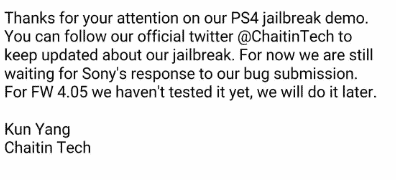Yep just shortly after the event and shortly after the announcement on Twitter that they informed Sony about the security flaws in their System
https://twitter.com/ChaitinTech/status/790949072429428737
There were quite a few people that were mad that they told Sony about this exploit but Chaitin Tech probably told them months ago before the event. So they could have a new update ready to go after the event. Now that is just me guessing what is happening with them and Sony as there are some many question but not enough anwsers. The PS4 Kernel Exploit in form of a bug report on FreeBSD. You can find the whole Bug Listing here.
Update:
It looks like Chaitin Tech hasn’t even checked if thier exploit still works on FW4.05. Thanks too mcmrc13 for emailing them and B7U3C50SS for pointing it out. Here’s what the email says..
“Topic: Incorrect argument validation in sysarch(2)
Category: core
Module: kernel
Announced: 2016-10-25
Credits: Core Security, ahaha from Chaitin Tech
Affects: All supported versions of FreeBSD.
Corrected: 2016-10-25 17:14:50 UTC (stable/11, 11.0-STABLE)
2016-10-25 17:11:20 UTC (releng/11.0, 11.0-RELEASE-p2)
2016-10-25 17:16:08 UTC (stable/10, 10.3-STABLE)
2016-10-25 17:11:15 UTC (releng/10.3, 10.3-RELEASE-p11)
2016-10-25 17:11:11 UTC (releng/10.2, 10.2-RELEASE-p24)
2016-10-25 17:11:07 UTC (releng/10.1, 10.1-RELEASE-p41)
2016-10-25 17:16:58 UTC (stable/9, 9.3-STABLE)
2016-10-25 17:11:02 UTC (releng/9.3, 9.3-RELEASE-p49)
CVE Name: CVE-2016-1885
For general information regarding FreeBSD Security Advisories,
including descriptions of the fields above, security branches, and the
following sections, please visit <URL:https://security.FreeBSD.org/>.
0. Revision history
v1.0 2016-03-16 Initial release.
v1.1 2016-10-25 Revised patch to address a problem pointed out by
ahaha from Chaitin Tech.
I. Background
The IA-32 architecture allows programs to define segments, which provides
based and size-limited view into the program address space. The
memory-resident processor structure, called Local Descriptor Table,
usually abbreviated LDT, contains definitions of the segments. Since
incorrect or malicious segments would breach system integrity, operating
systems do not provide processes direct access to the LDT, instead
they provide system calls which allow controlled installation and removal
of segments.
II. Problem Description
A special combination of sysarch(2) arguments, specify a request to
uninstall a set of descriptors from the LDT. The start descriptor
is cleared and the number of descriptors are provided. Due to lack
of sufficient bounds checking during argument validity verification,
unbound zero’ing of the process LDT and adjacent memory can be initiated
from usermode.
III. Impact
This vulnerability could cause the kernel to panic. In addition it is
possible to perform a local Denial of Service against the system by
unprivileged processes.
IV. Workaround
No workaround is available, but only the amd64 architecture is affected.
V. Solution
Perform one of the following:
1) Upgrade your vulnerable system to a supported FreeBSD stable or
release / security branch (releng) dated after the correction date.
Reboot is required.
2) To update your vulnerable system via a binary patch:
Systems running a RELEASE version of FreeBSD platforms can be updated
via the freebsd-update(8) utility:
# freebsd-update fetch
# freebsd-update install
Reboot is required.
3) To update your vulnerable system via a source code patch:
The following patches have been verified to apply to the applicable
FreeBSD release branches.
[*** v1.1 NOTE ***] If your sources are not yet patched using the initially
published advisory patches, then you need to apply both sysarch.patch and
sysarch-01.patch. If your sources are already updated, or patched with
patches from the initial advisory, then you need to apply sysarch-01.patch
only.
a) Download the relevant patch from the location below, and verify the
detached PGP signature using your PGP utility.
[ FreeBSD system not patched with original SA-16:15 patch]
# fetch https://security.FreeBSD.org/patches/SA-16:15/sysarch.patch
# fetch https://security.FreeBSD.org/patches/SA-16:15/sysarch.patch.asc
# gpg –verify sysarch.patch.asc
[ FreeBSD system that has been patched with original SA-16:15 patch]
# fetch https://security.FreeBSD.org/patches/SA-16:15/sysarch-01.patch
# fetch https://security.FreeBSD.org/patches/SA-16:15/sysarch-01.patch.asc
# gpg –verify sysarch-01.patch.asc
b) Apply the patch(es). Execute the following commands as root for
every patch file downloaded:
# cd /usr/src
# patch < /path/to/patch
c) Recompile your kernel as described in
<URL:https://www.FreeBSD.org/handbook/kernelconfig.html> and reboot the
system.
VI. Correction details
The following list contains the correction revision numbers for each
affected branch.
Branch/path Revision
– ————————————————————————-
stable/9/ r307941
releng/9.3/ r307931
stable/10/ r307940
releng/10.1/ r307932
releng/10.2/ r307933
releng/10.3/ r307934
stable/11/ r307938
releng/11.0/ r307935
– ————————————————————————-
To see which files were modified by a particular revision, run the
following command, replacing NNNNNN with the revision number, on a
machine with Subversion installed:
# svn diff -cNNNNNN –summarize svn://svn.freebsd.org/base
Or visit the following URL, replacing NNNNNN with the revision number:
URL: https://svnweb.freebsd.org/base?view=revision&revision=NNNNNN
VII. References
URL:https://cve.mitre.org/cgi-bin/cvename.cgi?name=CVE-2016-1885
The latest revision of this advisory is available at
URL:https://security.FreeBSD.org/advisories/FreeBSD-SA-16:15.sysarch.asc”
You can find the CVE of this Exploit here
Thanks to @raedoob for sending me the CVE Link on Twitter, plus EuroAli103 & PepeCobain95 for tweeting it too



